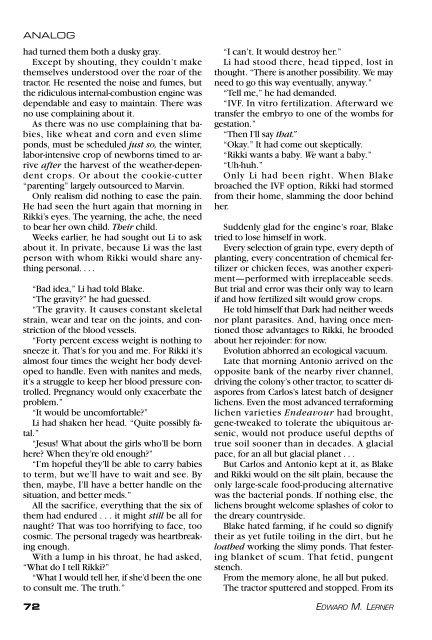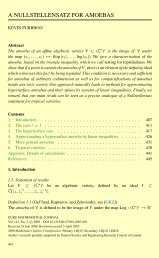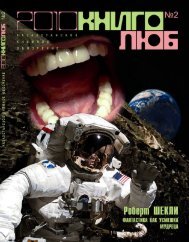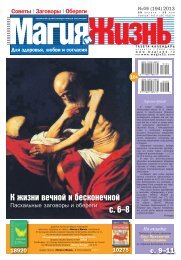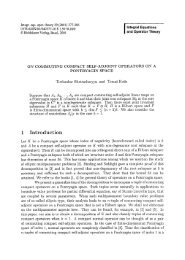Analog Science Fiction and Fact - June 2013
Analog Science Fiction and Fact - June 2013
Analog Science Fiction and Fact - June 2013
Create successful ePaper yourself
Turn your PDF publications into a flip-book with our unique Google optimized e-Paper software.
ANALOG<br />
had turned them both a dusky gray.<br />
Except by shouting, they couldn’t make<br />
themselves understood over the roar of the<br />
tractor. He resented the noise <strong>and</strong> fumes, but<br />
the ridiculous internal-combustion engine was<br />
dependable <strong>and</strong> easy to maintain. There was<br />
no use complaining about it.<br />
As there was no use complaining that babies,<br />
like wheat <strong>and</strong> corn <strong>and</strong> even slime<br />
ponds, must be scheduled just so, the winter,<br />
labor-intensive crop of newborns timed to arrive<br />
after the harvest of the weather-dependent<br />
crops. Or about the cookie-cutter<br />
“parenting” largely outsourced to Marvin.<br />
Only realism did nothing to ease the pain.<br />
He had seen the hurt again that morning in<br />
Rikki’s eyes. The yearning, the ache, the need<br />
to bear her own child. Their child.<br />
Weeks earlier, he had sought out Li to ask<br />
about it. In private, because Li was the last<br />
person with whom Rikki would share anything<br />
personal. . . .<br />
“Bad idea,” Li had told Blake.<br />
“The gravity?” he had guessed.<br />
“The gravity. It causes constant skeletal<br />
strain, wear <strong>and</strong> tear on the joints, <strong>and</strong> constriction<br />
of the blood vessels.<br />
“Forty percent excess weight is nothing to<br />
sneeze it. That’s for you <strong>and</strong> me. For Rikki it’s<br />
almost four times the weight her body developed<br />
to h<strong>and</strong>le. Even with nanites <strong>and</strong> meds,<br />
it’s a struggle to keep her blood pressure controlled.<br />
Pregnancy would only exacerbate the<br />
problem.”<br />
“It would be uncomfortable?”<br />
Li had shaken her head. “Quite possibly fatal.”<br />
“Jesus! What about the girls who’ll be born<br />
here? When they’re old enough?”<br />
“I’m hopeful they’ll be able to carry babies<br />
to term, but we’ll have to wait <strong>and</strong> see. By<br />
then, maybe, I’ll have a better h<strong>and</strong>le on the<br />
situation, <strong>and</strong> better meds.”<br />
All the sacrifice, everything that the six of<br />
them had endured . . . it might still be all for<br />
naught? That was too horrifying to face, too<br />
cosmic. The personal tragedy was heartbreaking<br />
enough.<br />
With a lump in his throat, he had asked,<br />
“What do I tell Rikki?”<br />
“What I would tell her, if she’d been the one<br />
to consult me. The truth.”<br />
“I can’t. It would destroy her.”<br />
Li had stood there, head tipped, lost in<br />
thought. “There is another possibility. We may<br />
need to go this way eventually, anyway.”<br />
“Tell me,” he had dem<strong>and</strong>ed.<br />
“IVF. In vitro fertilization. Afterward we<br />
transfer the embryo to one of the wombs for<br />
gestation.”<br />
“Then I’ll say that.”<br />
“Okay.” It had come out skeptically.<br />
“Rikki wants a baby. We want a baby.”<br />
“Uh-huh.”<br />
Only Li had been right. When Blake<br />
broached the IVF option, Rikki had stormed<br />
from their home, slamming the door behind<br />
her.<br />
Suddenly glad for the engine’s roar, Blake<br />
tried to lose himself in work.<br />
Every selection of grain type, every depth of<br />
planting, every concentration of chemical fertilizer<br />
or chicken feces, was another experiment—performed<br />
with irreplaceable seeds.<br />
But trial <strong>and</strong> error was their only way to learn<br />
if <strong>and</strong> how fertilized silt would grow crops.<br />
He told himself that Dark had neither weeds<br />
nor plant parasites. And, having once mentioned<br />
those advantages to Rikki, he brooded<br />
about her rejoinder: for now.<br />
Evolution abhorred an ecological vacuum.<br />
Late that morning Antonio arrived on the<br />
opposite bank of the nearby river channel,<br />
driving the colony’s other tractor, to scatter diaspores<br />
from Carlos’s latest batch of designer<br />
lichens. Even the most advanced terraforming<br />
lichen varieties Endeavour had brought,<br />
gene-tweaked to tolerate the ubiquitous arsenic,<br />
would not produce useful depths of<br />
true soil sooner than in decades. A glacial<br />
pace, for an all but glacial planet . . .<br />
But Carlos <strong>and</strong> Antonio kept at it, as Blake<br />
<strong>and</strong> Rikki would on the silt plain, because the<br />
only large-scale food-producing alternative<br />
was the bacterial ponds. If nothing else, the<br />
lichens brought welcome splashes of color to<br />
the dreary countryside.<br />
Blake hated farming, if he could so dignify<br />
their as yet futile toiling in the dirt, but he<br />
loathed working the slimy ponds. That festering<br />
blanket of scum. That fetid, pungent<br />
stench.<br />
From the memory alone, he all but puked.<br />
The tractor sputtered <strong>and</strong> stopped. From its<br />
72 EDWARD M. LERNER


